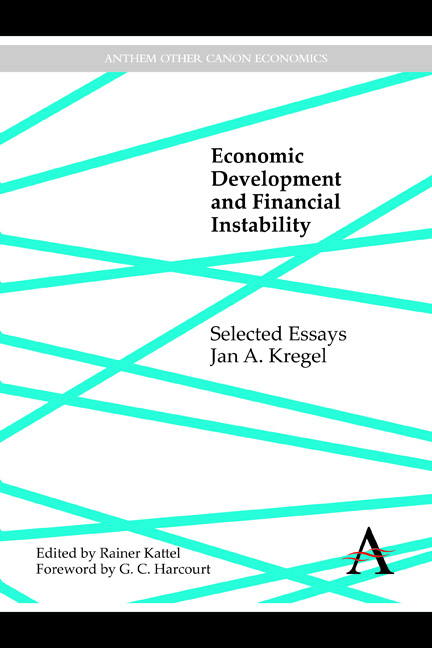Book contents
- Frontmatter
- Contents
- Foreword
- Publication History
- I Theoretical Discussions
- 1 Financial Markets and Economic Development: Myths and Institutional Reality
- 2 External Financing for Development and International Financial Instability
- 3 Capital Flows: Globalization of Production and Financing Development
- 4 Some Risks and Implications of Financial Globalization for National Policy Autonomy
- 5 Two Views on the Obstacles to Development
- 6 Can We Create a Stable International Financial Environment that Ensures Net Resource Transfers to Developing Countries?
- 7 Natural Instability of Financial Markets
- 8 Trying to Serve Two Masters: The Dilemma of Financial Regulation
- II Finance for Development
- III The Crisis in the US and the EU
- Index
5 - Two Views on the Obstacles to Development
from I - Theoretical Discussions
Published online by Cambridge University Press: 05 November 2014
- Frontmatter
- Contents
- Foreword
- Publication History
- I Theoretical Discussions
- 1 Financial Markets and Economic Development: Myths and Institutional Reality
- 2 External Financing for Development and International Financial Instability
- 3 Capital Flows: Globalization of Production and Financing Development
- 4 Some Risks and Implications of Financial Globalization for National Policy Autonomy
- 5 Two Views on the Obstacles to Development
- 6 Can We Create a Stable International Financial Environment that Ensures Net Resource Transfers to Developing Countries?
- 7 Natural Instability of Financial Markets
- 8 Trying to Serve Two Masters: The Dilemma of Financial Regulation
- II Finance for Development
- III The Crisis in the US and the EU
- Index
Summary
I count myself among the multitude given an introduction to the history of economic thought through Bob Heilbroner's The Worldly Philosophers. When I first read the book I was not sufficiently knowledgeable of foreign languages to recognize the distinguishing characteristic for those included in the book was having a unique Weltanschauung. These were not worldly philosophers in the sense of having experience of the world, but rather in the sense of having an individual worldview of economic development.
My recollection is that I had the book assigned as a basic text in the autumn of 1964. Most students of economics were then unaware of the implications of the UN Trusteeship Council's rapid creation of new independent states from former colonies and the problems of economic development that they would face. But, the June 1963 preface to the revised edition of The Worldly Philosophers (despite several transoceanic moves I still have my original copy) already notes that this shift reflected the change in economics toward “more concern over the trend of economic development” (Preface, p. ii).
Most of the specific discussion of development issues is found in the concluding chapter, “Beyond the Economic Revolution,” which laments that economists are not “in general today keenly aware of the historic responsibilities and implications” of making policy recommendations on appropriate priorities and strategies for developing countries:
The trend in economic thought in our time is not towards the “grand dynamics” of the future, but turns aside from such speculative social forecasting to consideration of more “scientific” matters.[…]
- Type
- Chapter
- Information
- Economic Development and Financial InstabilitySelected Essays, pp. 75 - 84Publisher: Anthem PressPrint publication year: 2014

